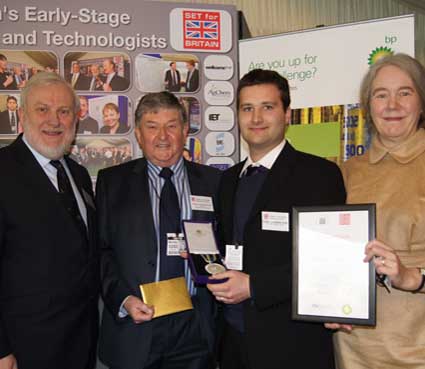13 March 2012
Matthew Powner, 30, a lecturer in the department of chemistry at University College London, struck gold at a competition in the House of Commons, for the excellence of his chemistry research today, walking away with a £3,000 prize.
Matthew presented his chemistry research to dozens of politicians and a panel of expert judges, as part of the poster competition SET for Britain, on Monday 12 March.
His research, which tries to understand how the processes behind genetics can be initiated in non-organic material, was judged against 29 other shortlisted researchers' work and came out on top.
Matthew explained that he was proud to have won. He said: "The research I undertake is fundamental research and it makes me proud to see something like this come out on top, at a time when there's such a big drive for research to deliver fast financial rewards."

Gold winner: Matthew Powner collects his award from, left to right, Andrew Miller MP, Professor David Phillips and Ellen Williams
SET for Britain is a competition in the House of Commons which involves researchers displaying posters of their work to panels of expert judges and politicians.
The event aims to help politicians understand more about the UK's thriving science and engineering base and rewards some of the strongest scientific and engineering research being undertaken in the UK.
Ellen Williams, chief scientist at BP, sponsors of the Chemical & Physical Sciences award, said, "As with last year, I am hugely impressed with the enthusiasm, creativity and insights of the young scientists I met today.
"As a major UK recruiter and investor in research and development, it is reassuring for BP that the next generation of scientific talent is emerging, ready to apply fresh thinking to everything from medicine to new energy solutions."
The Parliamentary and Scientific Committee run the event in collaboration with The Royal Academy of Engineering, The Institute of Physics, the Society of Biology, The Royal Society of Chemistry, the Physiological Society, the Wellcome Trust and the Society of Chemical Industry, with financial support from BP, Airbus/EADS, The Institution of Engineering and Technology, AgChem Access, Oxford Instruments, IBMS and GE Hitachi.
Notes for editors:
- SET for Britain is a poster competition in the House of Commons
- involving approximately 180 early stage or early career
researchers - judged by professional and academic experts. All
presenters are entered into either the engineering, the biological
and biomedical sciences, the physical sciences (chemistry), or the
physical sciences (physics) session, depending on their specialism.
Each session will result in the reward of Bronze, Silver and Gold
certificates. Bronze winners will receive a £1,000 prize;
Silver, £2,000; and Gold, £3,000. There will also be an
overall winner from the four sessions who will receive the
Westminster Wharton Medal.
SET for Britain was established by Dr Eric Wharton in 1997. Following his untimely death in 2007, the Parliamentary and Scientific Committee, with support from The Royal Academy of Engineering, The Institute of Physics, the Society of Biology, The Royal Society of Chemistry, the Physiological Society, the Wellcome Trust and the Society of Chemical Industry are working together to further his legacy.
The event is made possible by industry sponsors BP, Airbus/EADS, The Institution of Engineering and Technology, AgChem Access, Oxford Instruments, IBMS and GE Hitachi.
Early stage or early career researchers include university research students, postgraduates, research assistants, postdocs, research fellows, newly-appointed lecturers, part-time and mature students, returners, those people embarking on a second career, and their equivalent in national, public sector and industrial laboratories, and appropriate final year undergraduate and MSc students, all of whom are engaged in scientific, engineering, technological or medical research.


















